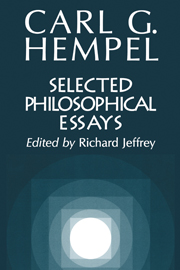TRUTH
Published online by Cambridge University Press: 05 June 2012
Summary
1 [2] “On the Logical Positivists' Theory of Truth,” Analysis 2 (1935), 49–59.
2 [6] “Some Remarks on ‘Facts’ and Propositions,” Analysis 2 (1935), 93–6.
3 [7] “Some Remarks on Empiricism,” Analysis 3 (1936), 33–40.
4 [12] “Le problème de la vérité,” Theoria 3 (1937), 206–46. Translated here by the author as “The Problem of Truth.”
5 [107] “The Signification of the Concept of Truth for the Critical Appraisal of Scientific Theories,” Nuova Civilità delle Macchine 8 (1990), 109–13. Here, “signification” is a misprint for “significance,” which is itself a wateringdown of “irrelevance” in the original typescript. This was reprinted under the title “The Significance of the Concept of Truth for the Critical Appraisal of Scientific Theories” (but it was listed in the table of contents as “Evidence and Truth in Scientific Inquiry”) in William R. Shea and Antonio Spadafora, eds., Interpreting the World (Canton, MA: Science History Publications, 1992), pp. 121–9. Here, I follow the original typescript.
Hempel's defense of Neurath's and Carnap's physicalism in essays 1–3 testifies to the presence of certain “postmodern” themes in logical empiricism (= logical positivism):
A textualist turn to sentences from the facts or reality they are said to report.
A pragmatic turn from truth to apt inclusion in the text as the basic scientific concern.
A descriptive turn from logic to the empirical sociology of science.
- Type
- Chapter
- Information
- Selected Philosophical Essays , pp. 5 - 8Publisher: Cambridge University PressPrint publication year: 2000



